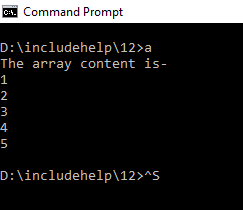C 中的 fread() 函數
原型:
size_t fread(void *buffer, size_t length, size_t count, FILE *filename);
參數:
void *buffer, size_t length, size_t count, FILE *filename
返回類型:size_t
函數的使用:
函數 fread() 的原型為:
size_t fread(void *buffer, size_t length, size_t count, FILE *filename);
在文件處理中,通過fread()函數,我們讀取count大小對象的數量length從輸入流filename到名為的數組buffer.它返回從文件中讀取的對象數。如果讀取的對象較少,或者EOF在此之前遇到它會報錯。
C 中的 fread() 示例
#include <stdio.h>
#include <stdlib.h>
int main()
{
FILE* f;
//initialize the arr1 with values
int arr1[5] = { 1, 2, 3, 4, 5 };
int arr2[5];
int i = 0;
//open the file for write operation
if ((f = fopen("includehelp.txt", "w")) == NULL) {
//if the file does not exist print the string
printf("Cannot open the file...");
exit(1);
}
//write the values on the file
if ((fwrite(arr1, sizeof(int), 5, f)) != 5) {
printf("File write error....\n");
}
//close the file
fclose(f);
//open the file for read operation
if ((f = fopen("includehelp.txt", "r")) == NULL) {
//if the file does not exist print the string
printf("Cannot open the file...");
exit(1);
}
//read the values from the file and store it into the array
if ((fread(arr2, sizeof(int), 5, f)) != 5) {
printf("File write error....\n");
}
fclose(f);
printf("The array content is-\n");
for (i = 0; i < 5; i++) {
printf("%d\n", arr2[i]);
}
return 0;
}輸出

相關用法
- C語言 freopen()用法及代碼示例
- C語言 frexp()用法及代碼示例
- C語言 feof()用法及代碼示例
- C語言 fillellipse()用法及代碼示例
- C語言 fgets()用法及代碼示例
- C語言 fclose()用法及代碼示例
- C語言 fseek() vs rewind()用法及代碼示例
- C語言 fflush()用法及代碼示例
- C語言 fgetc()用法及代碼示例
- C語言 fputc()用法及代碼示例
- C語言 fputs()用法及代碼示例
- C語言 fillpoly()用法及代碼示例
- C語言 ftell()用法及代碼示例
- C語言 fseek()用法及代碼示例
- C語言 fgets() and gets()用法及代碼示例
- C語言 fscanf()用法及代碼示例
- C語言 ferror()用法及代碼示例
- C語言 fgetc() and fputc()用法及代碼示例
- C語言 fwrite()用法及代碼示例
- C語言 fork()用法及代碼示例
注:本文由純淨天空篩選整理自Souvik Saha大神的英文原創作品 fread() function in C language with Example。非經特殊聲明,原始代碼版權歸原作者所有,本譯文未經允許或授權,請勿轉載或複製。
